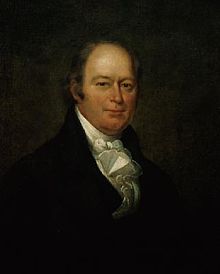William Johnson (judge)
| William Johnson | |
|---|---|
 |
|
| Associate Justice of the Supreme Court of the United States | |
|
In office May 7, 1804 – August 4, 1834 |
|
| Nominated by | Thomas Jefferson |
| Preceded by | Alfred Moore |
| Succeeded by | James Wayne |
| Speaker of the South Carolina House of Representatives | |
|
In office 1798–1800 |
|
| Preceded by | Robert Barnwell |
| Succeeded by | Theodore Gaillard |
| Personal details | |
| Born |
December 27, 1771 Charleston, South Carolina, British America |
| Died | August 4, 1834 (aged 62) New York City, New York, U.S. |
| Political party | Democratic-Republican |
| Spouse(s) | Sarah Bennett (1794–1834) |
| Education | Princeton University (BA) |
William Johnson (December 27, 1771 – August 4, 1834) was a state legislator and judge in South Carolina, and an Associate Justice of the United States Supreme Court from 1804 to his death in 1834.
Johnson was born in Charleston. His father, William Johnson, was a blacksmith and supporter of the American Revolution who represented Charleston in the general assembly. During the Revolution, he was among the patriots deported to St. Augustine by British commander Sir Henry Clinton. His mother, Sarah Johnson, née Nightingale, was also a revolutionary. "During the siege of Charleston, [she quilted] her petticoats with cartridges, which she thus conveyed to her husband in the trenches."
The younger Johnson graduated from Princeton University in 1790, read law with Charles Cotesworth Pinckney, passed the bar in 1793, and practiced in Charleston.
In 1794, he married Sarah Bennett, the sister of Thomas Bennett, Jr., who later served as Governor of South Carolina. They had at least one child, Anna Hayes Johnson, who was the second wife of Romulus Mitchell Saunders. Anna Johnson and Romulus Saunders were the parents of Jane Claudia Saunders, the wife of Bradley Tyler Johnson, who served as a general in the Confederate States Army during the American Civil War.
Johnson was an adherent of the Democratic-Republican Party, and represented Charleston in the South Carolina House of Representatives from 1794 to 1800. From 1798 to 1800 he served as Speaker of the House.
In 1798 Johnson was appointed an associate justice of the state Court of General Sessions and Common Pleas.
...
Wikipedia
